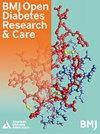Omentin associates with serum metabolite profiles indicating lower diabetes risk: KORA F4 Study
IF 3.7
2区 医学
Q2 ENDOCRINOLOGY & METABOLISM
引用次数: 0
Abstract
Introduction Circulating omentin levels have been positively associated with insulin sensitivity. Although a role for adiponectin in this relationship has been suggested, underlying mechanisms remain elusive. In order to reveal the relationship between omentin and systemic metabolism, this study aimed to investigate associations of serum concentrations of omentin and metabolites. Research design and methods This study is based on 1124 participants aged 61–82 years from the population-based KORA (Cooperative Health Research in the Region of Augsburg) F4 Study, for whom both serum omentin levels and metabolite concentration profiles were available. Associations were assessed with five multivariable regression models, which were stepwise adjusted for multiple potential confounders, including age, sex, body mass index, waist-to-hip ratio, lifestyle markers (physical activity, smoking behavior and alcohol consumption), serum adiponectin levels, high-density lipoprotein cholesterol, use of lipid-lowering or anti-inflammatory medication, history of myocardial infarction and stroke, homeostasis model assessment 2 of insulin resistance, diabetes status, and use of oral glucose-lowering medication and insulin. Results Omentin levels significantly associated with multiple metabolites including amino acids, acylcarnitines, and lipids (eg, sphingomyelins and phosphatidylcholines (PCs)). Positive associations for several PCs, such as diacyl (PC aa C32:1) and alkyl-alkyl (PC ae C32:2), were significant in models 1–4, whereas those with hydroxytetradecenoylcarnitine (C14:1-OH) were significant in all five models. Omentin concentrations were negatively associated with several metabolite ratios, such as the valine-to-PC ae C32:2 and the serine-to-PC ae C32:2 ratios in most models. Conclusions Our results suggest that omentin may influence insulin sensitivity and diabetes risk by changing systemic lipid metabolism, but further mechanistic studies investigating effects of omentin on metabolism of insulin-sensitive tissues are needed. Data from this KORA Study are not publicly available because the data are subject to national data protection laws, and restrictions were imposed by the Ethics Committee of the Bavarian Chamber of Physicians to ensure data privacy of the study participants. However, data are available on request to researchers through a project agreement from KORA (奥门冬酰胺与血清代谢物特征相关,表明糖尿病风险较低:KORA F4 研究
导言 循环网膜素水平与胰岛素敏感性呈正相关。虽然有人认为脂肪连通素在这种关系中发挥作用,但其潜在机制仍然难以捉摸。为了揭示网织蛋白与系统代谢之间的关系,本研究旨在调查血清中网织蛋白浓度与代谢物之间的关联。研究设计和方法 本研究基于以人群为基础的 KORA(奥格斯堡地区合作健康研究)F4 研究的 1124 名 61-82 岁参与者,这些参与者的血清网秦水平和代谢物浓度曲线均可获得。通过五个多变量回归模型评估了两者之间的关系,并逐步调整了多种潜在的混杂因素,包括年龄、性别、体重指数、腰臀比、生活方式指标(体育锻炼、吸烟行为和饮酒量)、这些因素包括年龄、性别、体重指数、腰臀比、生活方式指标(体力活动、吸烟行为和饮酒)、血清脂肪连接蛋白水平、高密度脂蛋白胆固醇、降脂药物或抗炎药物的使用情况、心肌梗死和中风病史、胰岛素抵抗的稳态模型评估2、糖尿病状态以及口服降糖药物和胰岛素的使用情况。结果网织红蛋白水平与多种代谢物(包括氨基酸、酰基肉碱和脂质,如鞘磷脂和磷脂酰胆碱(PCs))有明显关联。在模型 1-4 中,二酰基(PC aa C32:1)和烷基-烷基(PC ae C32:2)等几种 PC 的正相关性显著,而与羟基十四碳酰肉碱(C14:1-OH)的正相关性在所有五个模型中均显著。在大多数模型中,网秦浓度与几种代谢物的比率呈负相关,如缬氨酸-PC ae C32:2 比率和丝氨酸-PC ae C32:2 比率。结论 我们的研究结果表明,网秦可能会通过改变全身脂质代谢来影响胰岛素敏感性和糖尿病风险,但还需要进一步开展机理研究,探讨网秦对胰岛素敏感组织代谢的影响。这项 KORA 研究的数据不对外公开,因为这些数据受国家数据保护法的限制,而且巴伐利亚州医师协会伦理委员会为确保研究参与者的数据隐私也施加了限制。不过,研究人员可通过 KORA () 的项目协议索取数据。申请请发送至 [kora.passt@helmholtz-muenchen.de][1],并须获得 KORA 董事会的批准。[1]: http://kora.passt@helmholtz-muenchen.de
本文章由计算机程序翻译,如有差异,请以英文原文为准。
求助全文
约1分钟内获得全文
求助全文
来源期刊

BMJ Open Diabetes Research & Care
Medicine-Endocrinology, Diabetes and Metabolism
CiteScore
9.30
自引率
2.40%
发文量
123
审稿时长
18 weeks
期刊介绍:
BMJ Open Diabetes Research & Care is an open access journal committed to publishing high-quality, basic and clinical research articles regarding type 1 and type 2 diabetes, and associated complications. Only original content will be accepted, and submissions are subject to rigorous peer review to ensure the publication of
high-quality — and evidence-based — original research articles.
 求助内容:
求助内容: 应助结果提醒方式:
应助结果提醒方式:


